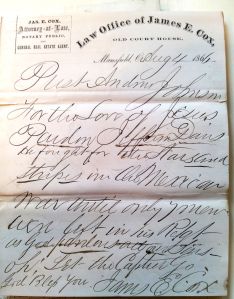As promised, I will now focus on a few letters that I have found particularly interesting. The pro-pardon letters that initially caused me to pay more attention to the religious theme draw considerable attention to the “guilt” of the Confederacy and the burden of “southern sins” that seemed to inevitably be falling on Jefferson Davis. Mrs. M.S. Kimbrough wrote to President Johnson from Georgia. Though the letter did not have a date, I suspect it was written shortly after Davis’ capture and imprisonment:
“When then is Jefferson Davis left to bear the burden of the Southern sins Can it be just that he alone should be the sacrifice. He is not more to blame than those of our sons who fought and bled for their homes and firesides. Should the gov’t be pleased to release him, its benign influence be as the “dew of Heaven which descended upon the mountains, for their God commanded the blessing.” It would insensible state into the Southern heart and cause its throbbings to be with love towards those we had looked upon as enemies and in the future we would naturally forget the wrong committed on both sides. But should Jefferson Davis be sacrificed, his blood will be to every Southern woman’s heart, what the blood of Jesus was to the women of the cross, who stood near by but in fear and trembling, something for them to cling to, to love, to hope for in the future.
Mr. George E. McClellan from Florida wrote that Davis’ “private character” was “of the purest kind,” and “added to which was a devotion to Religion adding luster to his moral work.” He continued on to by stating that “this Gentleman [was] endowed by Heaven with eminent abilities and so many Christian graces that even his failings lean to Virtues side…. He labored for us, and suffered with us. We have failed, and now … becomes a conquered people, why visit on his devoted head, the sins of the whole country. Believe us every blow inflicted on him, is a stab deep down into our hearts. The angel of affliction has swept over our unhappy land, scattering a thousand woes on every hearthstone…. Blessed are the merciful, for they shall obtain mercy.”
The undersigned petitioners from Macon, Georgia wrote on July 12, 1865, “we ask you to exercise towards him that justice and mercy which “the Prince of Peace” taught, when he laid before us the “golden rule” and that magnanimity which so well becomes the conqueror in the hour of friendship.”
These few letters help show the religious imagery that Southerners and ex-Confederates were invoking, hoping that an appeal to Johnson’s religious side would not only secure him in their favor but would also result in Davis’ release from prison. The frequency of terms like “guilt” or “sins” in reference to the South’s reasons for fighting the war was what surprised me most about these pro-pardon letters. The authors were almost begging for Johnson to forgive them of their sins, their transgressions, of slavery and the Confederacy. For all of the religious language that attributed Davis to Jesus, this one particular letter, written by a woman from Macon, Georgia, on August 13, 1865, made Johnson into the Jesus figure, which especially caught my attention. She wrote that she and others would gladly “bathe [his] feet with our tears and wipe them with our hair,” invoking the image of the sinful woman who washed Jesus’ feet with her tears and hair. What was the purpose of writing something like that? Was it simply a tool to gain Johnson’s attention, or did she actually view him as a Jesus-like man?
As interesting as these letters were (and they were very interesting!), they raised a great deal of questions about religion in the mid-nineteenth century, especially in the immediate post-war period. How much importance did Americans place on religion in the immediate aftermath of the war? Did Southerners really believe that they were “guilty” of sins and Davis, like Jesus, was to be sacrificed in order to clear them? Questions like these are not only compelling but are critical to answer to gain a better grasp on the intellectual climate of the country in the years after the American Civil War.
- Comment
- Reblog
-
Subscribe
Subscribed
Already have a WordPress.com account? Log in now.

I’m curious how former Southern soldiers would have felt, especially those who had recently surrendered. Many had fought for four terrible years amidst unimaginable suffering and loss. Did they view their fight and Confederate service in the same way? As a sin? A mistake? Hard to believe they would. These letters can also be very telling of immediate post war feelings of Davis and other former Confederate leaders by the common Confederate soldier and/or civilian. Thanks for sharing, these are an intriguing source.
I am really curious about how Confederate veterans felt about it, too. I agree that they probably did not view their service and cause as a sin or mistake. My question is where are all of their post-war writings that would give insight into their thoughts about the punishment of their former leaders? I hope to find them somewhere. Thanks for the comment!